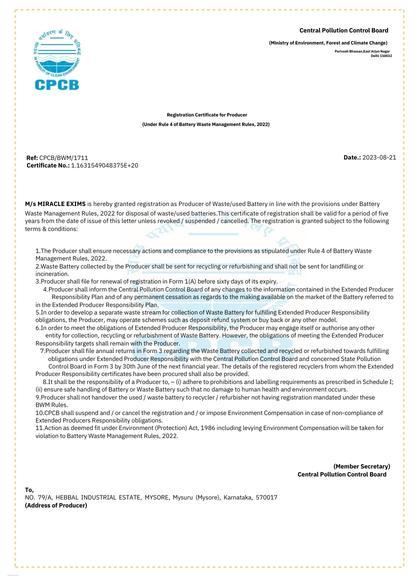Apply EPR License in 1 day and get your Custom Clearance
- Consulted 400 + EPR Registrations
- Free Experts Assistance
- Minimum Price guaranteed
- Quick and Hassle-Free Process
- Free Consultation on Import-Export Compliance
- 20 years experience & Serving more than 1100+ companies
- Providing one stop solution for all Annual compliances
CONTACT US
Our advisor is just a call away
Introduction of EPR Registration in Battery Waste Management
The Battery (Management and Handling) Rule, 2001 was replaced on August 22, 2022, by a battery waste management rule, 2022, which aims to handle old batteries in an ecologically friendly manner.
These regulations apply to all batteries, including industrial, automotive, portable, and batteries for electric vehicles. A battery producer (including importers) is required by law to collect and recycle used batteries and to employ recovered materials in the production of new batteries. EPR mandates the collecting and recycling of used batteries instead of their disposal in landfills or incineration. To fulfil the EPR responsibilities, waste batteries may be gathered, recycled, or repaired by producers themselves or by any other body. To make sure that manufacturers complete their commitments, the rules will create a centralised web platform and system for transferring EPR certifications. The regulations for gathering, recycling, and repairing used batteries promote the development of new industries and entrepreneurship. EPR Certificate for battery waste management is mandatory for all battery manufacturers.
Liability Imposed On
The Battery Waste Management Rules 2022 (Rule 4(4)) apply to every producer, importer, reconditioner, assembler, dealer, recycler, consumer, and bulk consumer that makes, processes, sells, acquires, or uses batteries or their components.Those that produce or manufacture batteries must register on Form 1(A) as “Producers” in order to use the centralised online portal.The criteria include all battery types, regardless of chemistry, size, or form.
These laws do not apply to batteries used in equipment related to the defence of vital security interests, such as weapons, ammunition, war materials, and equipment made especially for military use or for space flight.
Documentation Required for Registration
- Gst Copy With Sign And Stamp
- Authorized Person Pan Card
- Authorized Person Aadhar Card
- Company Pan Card
- Company CIN Number
- Company TIN Number
- Consent To Operate (CTO) (Air/Water Act and Authorization) Under Hazardous Waste Rules. (If Involved In Production Facility)
- District Industries Center (DIC) Registration Certificate
- Import Export Certificate In Case Of Importer (IEC)
- Gstr 9 / Balance Sheet Of Previous Financial Year.
- Authorized E-Mail Id
- Website Address
- Mobile Number
Duties of Importers, Manufacturers, Producers, Assemblers, and Re-Conditioners
A manufacturer, importer, builder, and reconditioner must follow these rules-
- Collect used batteries in accordance with the Schedule in comparison to new batteries purchased from original equipment makers and large customers.
- Maintain the same identity and features for both the new batteries sold and the recycled batteries.
- Every six months, by June 30 and December 31, the State Board must submit its Form-I returns outlining their sales and buybacks.
- Create collection centres to gather spent batteries at numerous locations, either separately or collectively.
- To recycle old batteries, utilise only licenced recyclers.
- Make agreements with dealers for secure transportation between collection facilities and registered recyclers.
- Make sure that nothing harms the environment while it is being transported.
- Promote the following through publications, posters, publications, and other means: Lead danger ; The consumer is responsible for returning old batteries to dealers or specified drop-off places; Dealers and designated collection centres’ addresses
- Make sure the batteries have the global recycling emblem on them.
- Purchase recycled lead only from authorised recyclers.
- Any infractions by dealers should be reported to the State Board or the Ministry of Environment and Forests.
- Make sure that only licenced vendors should sell fresh batteries.
Duties of Recyclers
As a recycler, you must-
- Send the information on Form VI to the Ministry of Environment and Forests or a body it has authorised if you haven’t previously filed for registration.
- The terms and conditions of registration must be rigorously adhered to; nevertheless, those registered with the Ministry of Environment and Forests or other organisations it designated to reprocess old batteries will also be subject to those terms and restrictions.
- Annual returns must be submitted to the State Board after Form VI.
- Make sure that the State Board can access all of the records.
- Lead that has been reprocessed should be labelled “Recycled.”
- Advocacy, publications, posters, and other techniques should be utilised to inform the public about lead risks and the requirement for customers to only return used batteries to authorised collection sites or registered dealers.
Schedule
(Rule 4(i) and 7(i))
| S.No. | Year | Number of used batteries to be collected back |
| 1. | During the first year of implementation of rules | 50% of new batteries sold |
| 2. | During the second year of implementation of rules | 75% of new batteries sold |
| 3. | After the second year of implementation of the rules | 90% of new batteries sold |
Steps to obtain an EPR certificate for battery waste management and register with the CPCB
STEP 1- Make Global Solution Your Partner
Contact the Global Solution team at +91 9999253054 or send an email to support2@globalsolution.co.in to discuss the unique requirements for your company. It takes 20 to 25 minutes to discuss needs. Once you’ve discussed the situation with our devoted team, we’ll help you. They will offer answers and all the help you require.
STEP 2- Submission of Required Documents
During EPR Registration for battery waste management, our staff will ask you for the information and supporting paperwork needed.
STEP 3- Payment Process
The government fees can be paid via the site after the required paperwork has been sent; we will provide you more information on the payment process.
STEP 4- Realtime Progress Updates
Our staff allows you to follow the status of your application in real time throughout the registration process.Transparency is ensured by this function, which also keeps you updated on jobs that have been finished and those that are still in process.
STEP 5: Issuing Certificates
After our staff has examined the paperwork, the application is sent to the CPCB, who will examine it and give the necessary certifications. As soon as the procedure is finished, your registration and accreditation will be sent to the email address you supplied.
To satisfy your company’s demands, Global Solution provides efficient and effective solutions. Please do not hesitate to get in touch with us if you want any more assistance or clarification. We’ll be happy to help you with the authorization requirements.
Renewal Procedure of EPR Authorization for battery waste management
A Form 5 renewal request must be filed at least six months before the license’s expiration date. Before renewing the recycler’s registration, CPCB personnel or other organisations chosen by the CPCB or the Member Secretary should assess the merits of each case.
Sample of a Grant Certificate for BWM






















